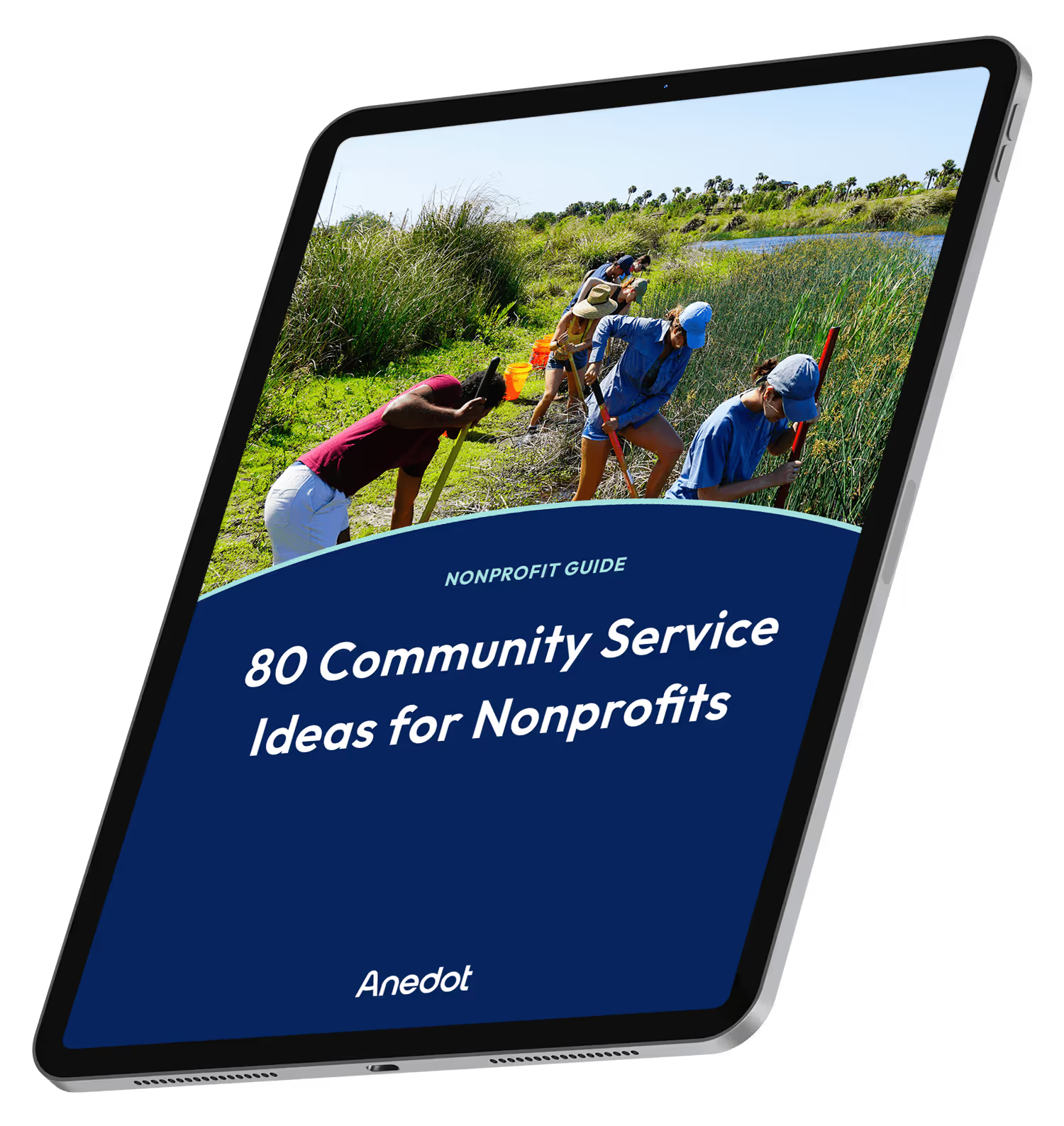As a nonprofit, you’re no stranger to fundraising.
Whether through events, donor solicitation, or other means, fundraising keeps your organization running and doing the work at hand.
Some projects or needs require more significant funding than your nonprofit can budget through your traditional fundraising efforts.
A capital campaign allows you to raise substantial funds that meet those needs.
Read on to learn more about capital campaigns and how you can start yours today.
What is a capital campaign?

Capital campaigns are a subtype of fundraisers that nonprofits take on when they have a big need that requires significant financial support and backing.
Unlike most fundraising efforts, capital campaigns are drawn out, typically lasting anywhere from six months to five years.
Capital campaigns begin with a long-term vision, with goals that take months or years to achieve, and are completed within a set period.
Nonprofits and their campaign leads set impressive goals that require coordination and cooperation from all organization heads, team members, and your community of supporters and donors.
The nature of such a campaign brings in significant gifts and funding. It takes your entire organization and the support of your community to reach the goals set in your campaign.
A capital campaign typically supports a specific project or undertaking.
Unlike other fundraisers that bring in donations that help set your annual budget or help boost year end giving, capital campaign income is designated to a singular purpose or fund.
You won’t count on capital campaign dollars to cover your overhead, but these funds are directed to a predetermined project.
Capital campaigns require significant work at all stages, from planning to completion.
But when executed well, they provide innumerable benefits to your nonprofit.
We explore those below.
The 5 benefits of running a capital campaign

Large-scale fundraising delivers many benefits that small-scale events simply can’t.
We list a few benefits of capital campaigns below.
1. Unifying your entire community around one project
A successful capital campaign requires buy-in from everyone in your organization and many volunteers and donors.
Because these campaigns require such great focus, they can unify your community toward a common goal.
2. Building awareness for your organization and needs
Because your capital campaign requires high-level time, energy, and focus from your team and community, you can use it to raise awareness for your organization and the other needs you have.
3. Maximizing your impact
Capital campaigns will raise more funding than your smaller annual events.
You can do more good if you have more resources to work with.
A successful capital campaign empowers your organization to maximize its impact.
4. Engaging press and news outlets
A capital campaign can garner the attention of relevant outlets, like the press and media.
Local press wants to cover a well-organized, well-publicized nonprofit fundraising campaign.
Their viewers want to hear about local organizations doing good work, and you’ll benefit from the exposure.
5. Increase the likelihood of attracting new major donors
Major gift donations comprise much of your capital campaign fundraising.
As your team strategizes major donor solicitation, you can increase the likelihood of attracting new large-gift donors.
Securing a major donor for your capital campaign boosts the probability that they’ll continue to support your nonprofit in the future.
A capital campaign can be an effective path to soliciting new major donors.
How to start a capital campaign

Capital campaigns aren’t for the faint of heart. They require your entire team to work together toward a singular goal for an extended period.
A considerable amount of planning, organization, and preparation goes into executing a successful campaign wherein you achieve your goals.
But if you embark on your capital campaign with the right plan, goals, and people, you’ll find that even the loftiest of goals can be met.
Beginning a capital campaign is the most challenging step in its execution.
Here are some practical steps to start your campaign below.
1. Determine a worthy cause or goal
The first step in any capital campaign is identifying a need or goal.
Your campaign will require your entire organization's physical, mental, and emotional investment. You shouldn’t start a capital campaign unless you have a clear direction and worthwhile causes.
Evaluate your organization’s needs or goals.
Do you need a new building or property? New equipment or large-scale purchases?
Once you’ve determined your needs, ask yourself and your team if a capital campaign is the most effective method to meet those needs.
2. Set a monetary goal
Once you’ve determined a worthy cause or goal, set a monetary goal for your capital campaign.
Remember, a capital campaign can last for years. Set big goals!
Publicly establishing your fundraising goals can compel people toward generosity and be an effective tool to bring in more donations.
Donors are motivated to give when there’s a concrete target and you’re close to reaching it.
Let’s say you’re at 65 to 80 percent of your target campaign goal.
At this point, the remaining amount can reasonably be reached.
The social proof of others’ generosity combined with the likely success of the campaign incentivizes others to give to your cause.
Setting a fundraising goal is essential for planning and strategizing for your capital campaign, but it can also help you earn more donations, especially as your campaign comes to a close.
3. Determine a realistic timeline
As discussed above, capital campaigns are drawn-out fundraisers.
You should expect them to last at least six months. More often, a campaign will last more than a year.
Set a realistic timeline that allows you to reach your fundraising goals.
Too short, and you won’t have time to hit your target.
If a campaign lasts too long, your team and support can grow weary and lose excitement for the cause.
Set a timeline, and stick to it.
You’ll find that a hard and fast timeline creates a sense of urgency that compels donors to give, especially as the end of your campaign draws near.
4. Earn buy-in from leaders and rally your community
By now, you know that a small team cannot execute a capital campaign alone.
You need buy-in from the top of your organization, your team, volunteers, donors, and others for your campaign to succeed.
Understand that you should only start a capital campaign with commitment from your team.
Attempting to organize and execute a campaign when everyone isn’t on board will cause tension, conflict, and burnout. And ultimately, your campaign has a high chance of failure.
Earning buy-in from nonprofit heads, leaders, and your community ensures you have the workforce to execute a successful capital campaign.
5. Follow a strategic solicitation order
Once you’ve outlined the basics of your capital campaign, the fundraising begins.
Most of the gifts from your campaign will come from major gift donors (ranges vary from 65-80 percent.)
Follow a strategic solicitation order that targets major donors first.
After you’ve engaged with all major gift leads behind the scenes, take your campaign public, and let the kickoff begin!
6. Make giving easy
Donation collection should be simple.
The less friction in the giving process, the more likely your donors will give.
Running a capital campaign demands a lot from your team. You need a fundraising software that’s effortless and secure.
Anedot helps you save time and money with powerful giving tools.
With Anedot, you are able to build high-conversion pages that simplify your capital campaign collection. We control the financial stack end-to-end, giving you control over your data and deposits.
Capital campaigns that work

Your capital campaigns can fund seemingly impossible projects with the right planning, strategy, and tools.
At Anedot, we know that every cent counts when you’re running a nonprofit and executing these campaigns.
Schedule a consultation call today to learn how Anedot can serve you with powerful online giving tools that save time and money.

80 Community Service Ideas for Nonprofits























